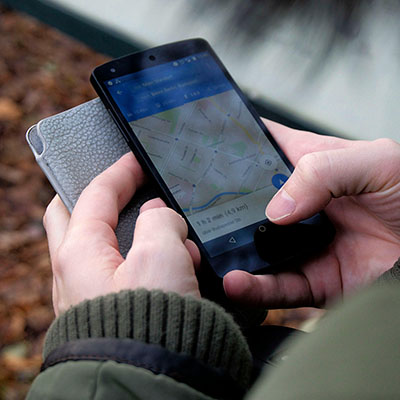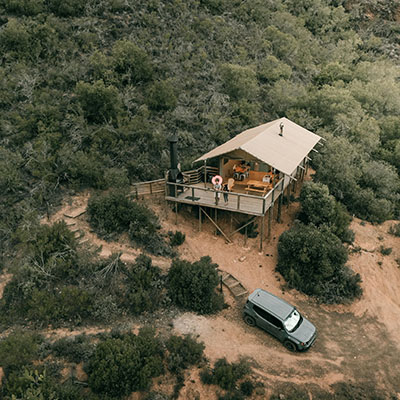You can read as many expert travel tips as you want, but you can’t plan for everything. That’s why you need to arm yourself with some of the best hacks for travel.
Whether you're road tripping to the next state or adventuring abroad, take these easy steps to make sure you're prepared for the unexpected.
1. Be creative with accommodations.
We often default to hotels when we think about booking a place to stay, but with a little creativity, you can find someplace unique. This is also one of our favorite travel hacks to save money.
On Airbnb, you can usually rent an entire apartment for the price of a hotel room. These can be basic with just enough amenities to give you a safe, clean place to lay your head at night. Or they can be extra quirky with character and luxury to spare. A good host will also have local recommendations for restaurants and must-see sites.
Another option that’s often overlooked is farm stays. Booking lodging at a farm, orchard, or other worksite gives you a fresh perspective of your destination. Plus, because you’re paying for your accommodations by putting in a few hours of labor each day, it’s a good way to save a bit of money.
2. Pack clothes you no longer need or want.
You can donate these items before traveling back home and make more room for travel treasure. You also can lighten your packing by forgoing some toiletries and relying on the stock in your hotel.
3. Ship some items to your hotel.
This is especially helpful if you’re traveling for an extended time, such as if you’re adopting the long-term digital nomad lifestyle, or you have extra gear like golf equipment. Mailing some of your items can help cut down on baggage fees and lugging things through the airport. Try this with presents if you’re flying during the holidays, too.
4. Rethink your cell phone coverage.
Double-check your cell phone plan to make sure you don’t get hit with unexpected charges. Look for free Wi-Fi at restaurants, libraries, or near schools.
Find alternative ways to communicate when traveling internationally. Using apps like WhatsApp allows you to call and text via the internet instead of racking up roaming charges.
5. Make digital copies of important documents.
Emailing a copy of your passport, credit cards, tickets, and other important documents is a good way to store this information in case you lose the physical copies. Another secure way might be to save a copy to the Cloud.
6. Pack a portable power bank charger.
You’ll be glad you have some extra juice when you’re on the go all day and your phone battery runs low or your laptop needs a bit of extra power (hello, digital nomads). Many of these power banks can be charged by plugging them into a TV, ideal if you need an extra outlet.
7. Make it impossible to forget your charger.
It’s easy to plan to grab your charger from the wall outlet before you check out, but how do you actually remember it when you’re packing and rushing out of your hotel room?
“When you get to your hotel, unpack your suitcase and place it next to a wall outlet,” says Luke Armstrong. “Plug in your charger and wrap the cord around the suitcase handle. You aren't likely to forget your suitcase, so odds are you will also remember to take the charger connected to it.”
8. Travel at non-peak times.

Traveling during the off-season or non-peak times during the week is a great travel hack for flying if you have travel anxiety or are taking a trip with someone with sensory challenges. With fewer fellow travelers in the same space, there’s less noise and employees may have more time to provide additional assistance if you need it.
9. Check out what’s on the way to your destination.
If you have a long layover or are driving, use that time to build in bonus sightseeing. For extended layovers, take a journey outside the airport for a meal or a museum.
When road tripping, take a break for dinner or stretch your legs with a walk through a park or zoo to burn off some pent-up energy. Knowing a few travel hacks for kids when you’re taking a road trip can be a real sanity-saver.
10. Download a map.
All the benefits of Google Maps won’t do you much good if you don’t have internet access. Before you leave home, download maps of the areas you’ll be in so you can still navigate when you’re offline. A good old-fashioned paper map works, too. How very vintage of you.
11. Use items for more than their intended purpose.
Lots of items can be used in multiple ways. You’ll look like a travel all-star and save room in your luggage when you pack a few small, multipurpose items.
Luke recommends binder clips. “I love them. I clip them onto my pockets to neatly contain my things. I know where my money, airline tickets, and credit cards are and have the confidence that even if I do a cartwheel, they won’t get lost.”
But that’s not all. “Binder clips will also protect the heads of your razor,” he said. “And they can keep that mess of electronic cords organized."
Duct tape can fix just about anything. Have a rip in your backpack? Duct tape it. Need to secure a lid on something? Again, duct tape. And if you’re worried about that silver adhesive looking tacky, they now make duct tape in a variety of colors and patterns that usually are just as effective as the original gray.
Bandanas are just as versatile as duct tape. Use it as a scarf, a washcloth or towel, a small sack, or a bandage in a pinch.
Finally, dryer sheets. If you pack a few dryer sheets with you, you can keep your bag and clothes smelling fresh even after you’ve worn them.
12. Protect your valuables with a good hiding spot.
Hiding money, passports, and other important items under the mattress never fooled anyone. If your room has a safe, use it. If not, be more creative with where you stash your valuables. Just remember to collect everything when you check out.
See Luke’s favorite hack for protecting valuables when you travel.
13. Make sure your U.S. cash is clean and new.
It’s a good idea to carry a bit of cash on you when you travel, even when overseas and your currency is different than your destination’s. Having cash on hand is convenient if you need to exchange a bit of money quickly and an ATM isn’t available. In some cases, your host country might accept U.S. dollars, even if they also use something else.
You’ll have better luck using the cash you carry if it’s new and clean, as Luke found out when traveling from Kenya to Uganda. Needing to pay the $50 fee in cash to cross the border and without local currency available, Luke dipped into his emergency stash of U.S. dollars.
The $100 bill he planned to use, however, was from 2006. The border official told Luke they couldn’t accept bills from before 2008.
“For whatever reason, many countries throughout the world will not accept a U.S. note unless it is free of any tears, serious wear, and marks,” explains Luke. “Some countries like Uganda will not take bills minted more than five years ago.”
14. Have a backup money source.
You don’t want to carry around a bunch of unnecessary valuables, but a bit of extra money and a spare credit card are good to have.
Why extra cash? Depending on where you are, it’s simply not enough to rely only on credit cards and ATMs. A card might get rejected. An ATM might not be working or decide it won’t accept your foreign PIN.
Hide your extra money and credit card somewhere separate from the rest of your wallet. That way, if one gets stolen, you aren’t stranded without any funds available. “I tend to stash an emergency debit/ATM card in the lining of my suitcase with a $50 bill or two,” says Luke.
Travel Insurance for the Unexpected
Duct tape can do a lot, but it’s no replacement for travel insurance. Find the right protection for your belongings, health, and money by using our interactive tool. A quick call to one of our licensed agents can help, too. The right preparation makes all the difference when the unexpected happens.
Travel Like a Pro with The Wayfinder
Did you enjoy this blog? Get more articles like it before anyone else when you subscribe to our monthly newsletter, The Wayfinder.

